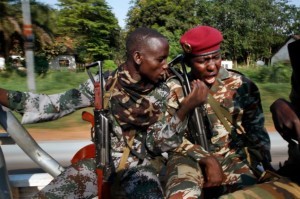The armed group took over the school little by little. One day when a fighter came to collect and burn the students’ desks, teacher Thiernd Ouronfei decided he’d had enough.
“I said he must put the kids’ desks down. They hit me in the head with a knife and I was sent to the hospital for at least a week,” he said. Even now, after the school in Central African Republic was liberated, parents are scared to send their children, he told The Associated Press.
Some 20 percent of schools in Central African Republic are not functioning, and students’ and teachers’ lives are threatened as armed groups have looted, occupied and damaged the properties in the conflict-torn country, according to a Human Rights Watch report released Thursday. An education is a rare opportunity for children in the impoverished country to get ahead.
“We’re talking about a lost generation. These are students who aren’t going to get those years back,” said Lewis Mudge, the group’s Africa researcher and co-author of the report. “Many rebels have also been quite open that they are going to reoccupy schools during the upcoming rainy season.”
Central African Republic descended into conflict in 2013 when the mostly Muslim Seleka rebels overthrew the Christian president. The Christian anti-Balaka militia retaliated with a backlash against Muslim civilians.
While the country held successful democratic elections last year, many remote areas remain outside the government’s control. Violence by armed groups has risen sharply since October. Various armed groups have used the schools as bases for years.
Human Rights Watch, which visited schools between November and January and interviewed children and teachers as well as fighters, has called on the country’s government and the United Nations to do more to ensure that armed groups stay far away from classrooms. In some cases, fighters may vacate a school, but still operate meters away.
One student in Ngadja in Ouaka province told Human Rights Watch that he feared for his life after Seleka fighters occupied a nearby school on and off for more than two years.
“I often ask myself, ‘Should I even bother to go to school? Is it worth the risk?'” he said.
The Seleka rebels for months used the school director’s office as a prison, teachers in Ngadja told the rights group.
“I’m afraid of the Seleka hanging around the school. So I can’t go, and that makes me just as uneducated as an animal,” a 15-year-old student in Mbres, Nana Grebizi province, told the rights group. In Mbali, Ouham province, a 16-year-old said classes finally started again in November after three years, “but they had burned all the books, and we don’t have any left.”
An 18-year-old student said he had lost four years of his life because he wasn’t able to study. “I want to be a doctor, but the Seleka are blocking my future.”
In November, the U.N. humanitarian office estimated that while 2,336 schools in Central African Republic were operational, at least 461 were not because of insecurity, destruction, occupation and lack of teachers.
Central African Republic’s government in 2015 committed to protecting schools from attack and military use and permitted U.N. forces to clear them. Progress was made but then undermined when U.N., African Union and French forces in some cases occupied schools themselves, Human Rights Watch said. Once U.N. officials were informed, they left, the group said.
“If there are to be any meaningful attempts at peace or at reconciliation, it’s important to restart these structures that provide a degree of normalcy,” Mudge said.
Source: AFP

